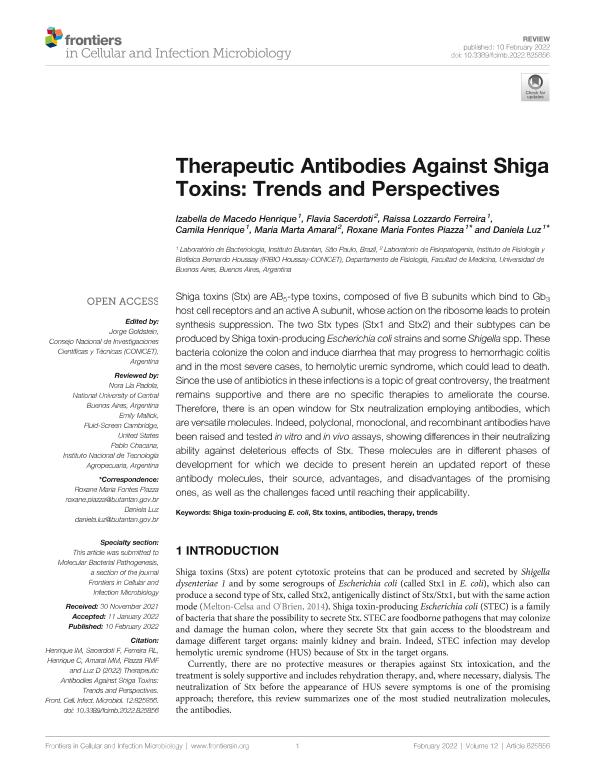Mostrar el registro sencillo del ítem
dc.contributor.author
de Macedo Henrique, Izabella
dc.contributor.author
Sacerdoti, Flavia

dc.contributor.author
Lozzardo Ferreira, Raissa
dc.contributor.author
Henrique, Camila
dc.contributor.author
Amaral, María Marta

dc.contributor.author
Fontes Piazza, Roxane María

dc.contributor.author
Luz, Daniela
dc.date.available
2023-07-14T20:18:29Z
dc.date.issued
2022-02
dc.identifier.citation
de Macedo Henrique, Izabella; Sacerdoti, Flavia; Lozzardo Ferreira, Raissa; Henrique, Camila; Amaral, María Marta; et al.; Therapeutic Antibodies Against Shiga Toxins: Trends and Perspectives; Frontiers Media; Frontiers in Cellular and Infection Microbiology; 12; 2-2022; 1-15
dc.identifier.issn
2235-2988
dc.identifier.uri
http://hdl.handle.net/11336/204054
dc.description.abstract
Shiga toxins (Stx) are AB5-type toxins, composed of five B subunits which bind to Gb3 host cell receptors and an active A subunit, whose action on the ribosome leads to protein synthesis suppression. The two Stx types (Stx1 and Stx2) and their subtypes can be produced by Shiga toxin-producing Escherichia coli strains and some Shigella spp. These bacteria colonize the colon and induce diarrhea that may progress to hemorrhagic colitis and in the most severe cases, to hemolytic uremic syndrome, which could lead to death. Since the use of antibiotics in these infections is a topic of great controversy, the treatment remains supportive and there are no specific therapies to ameliorate the course. Therefore, there is an open window for Stx neutralization employing antibodies, which are versatile molecules. Indeed, polyclonal, monoclonal, and recombinant antibodies have been raised and tested in vitro and in vivo assays, showing differences in their neutralizing ability against deleterious effects of Stx. These molecules are in different phases of development for which we decide to present herein an updated report of these antibody molecules, their source, advantages, and disadvantages of the promising ones, as well as the challenges faced until reaching their applicability.
dc.format
application/pdf
dc.language.iso
eng
dc.publisher
Frontiers Media

dc.rights
info:eu-repo/semantics/openAccess
dc.rights.uri
https://creativecommons.org/licenses/by-nc-sa/2.5/ar/
dc.subject
ANTIBODIES
dc.subject
SHIGA TOXIN-PRODUCING E. COLI
dc.subject
STX TOXINS
dc.subject
THERAPY
dc.subject
TRENDS
dc.subject.classification
Enfermedades Infecciosas

dc.subject.classification
Ciencias de la Salud

dc.subject.classification
CIENCIAS MÉDICAS Y DE LA SALUD

dc.title
Therapeutic Antibodies Against Shiga Toxins: Trends and Perspectives
dc.type
info:eu-repo/semantics/article
dc.type
info:ar-repo/semantics/artículo
dc.type
info:eu-repo/semantics/publishedVersion
dc.date.updated
2023-07-03T16:36:08Z
dc.journal.volume
12
dc.journal.pagination
1-15
dc.journal.pais
Suiza

dc.description.fil
Fil: de Macedo Henrique, Izabella. Governo do Estado de Sao Paulo. Secretaria da Saude. Instituto Butantan; Brasil
dc.description.fil
Fil: Sacerdoti, Flavia. Consejo Nacional de Investigaciones Científicas y Técnicas. Oficina de Coordinación Administrativa Houssay. Instituto de Fisiología y Biofísica Bernardo Houssay. Universidad de Buenos Aires. Facultad de Medicina. Instituto de Fisiología y Biofísica Bernardo Houssay; Argentina
dc.description.fil
Fil: Lozzardo Ferreira, Raissa. Governo do Estado de Sao Paulo. Secretaria da Saude. Instituto Butantan; Brasil
dc.description.fil
Fil: Henrique, Camila. Governo do Estado de Sao Paulo. Secretaria da Saude. Instituto Butantan; Brasil
dc.description.fil
Fil: Amaral, María Marta. Consejo Nacional de Investigaciones Científicas y Técnicas. Oficina de Coordinación Administrativa Houssay. Instituto de Fisiología y Biofísica Bernardo Houssay. Universidad de Buenos Aires. Facultad de Medicina. Instituto de Fisiología y Biofísica Bernardo Houssay; Argentina
dc.description.fil
Fil: Fontes Piazza, Roxane María. Governo do Estado de Sao Paulo. Secretaria da Saude. Instituto Butantan; Brasil
dc.description.fil
Fil: Luz, Daniela. Governo do Estado de Sao Paulo. Secretaria da Saude. Instituto Butantan; Brasil
dc.journal.title
Frontiers in Cellular and Infection Microbiology
dc.relation.alternativeid
info:eu-repo/semantics/altIdentifier/url/https://www.frontiersin.org/articles/10.3389/fcimb.2022.825856/full
dc.relation.alternativeid
info:eu-repo/semantics/altIdentifier/doi/http://dx.doi.org/10.3389/fcimb.2022.825856
Archivos asociados
